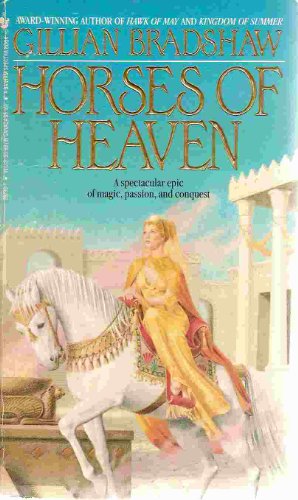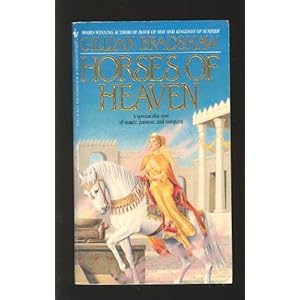
![]() Horses of Heaven by Gillian Bradshaw
Horses of Heaven by Gillian Bradshaw
Gillian Bradshaw’s Horses of Heaven is a historical fantasy set in a place and time far from fantasy’s beaten path: central Asia in 140 B.C. It takes place in the kingdom of Ferghana, which was once on the eastern fringe of Alexander’s empire. Now, Alexander is long dead and Ferghana is an uneasy mix of Greeks and native Sakas. The widowed King Mauakes makes a political marriage with a Greco-Bactrian princess, Heliokleia, but he is abusive toward her and their marriage is a disaster from the start. When Heliokleia instead falls in love with Mauakes’ handsome son Itaz, and he with her, the situation becomes as incendiary as Greek fire.
It’s a time and place where many ideas and philosophies competed for dominance, and there are many debates within these pages: the merits of Buddhism vs. Zoroastrianism vs. the Greek pantheon vs. Saka sun worship, for example, and differing views of governance, warfare, and women’s rights.
The “talkiness” of Horses of Heaven is both a strength and a weakness. The religious and philosophical debates are fascinating and do a great job of defining the characters and their relationships to one another. On the other hand, the book is occasionally a bit dry and bogged down in bureaucratic process, particularly in the first half. Later, as the love story blooms more fully, it alleviates this issue. It’s a pretty archetypal triangle, but Bradshaw elevates it by fleshing out all three of the principals rather than making them stock figures.
Bradshaw’s decision regarding point of view is one of the most unusual I’ve seen. Horses of Heaven is ostensibly in first person, told by Tomyris, a young Saka who is chosen as a lady-in-waiting to Heliokleia. Yet Tomyris only talks about herself in brief and scattered moments, and narrates scenes from the three leads’ lives as though she were a third-person narrator: showing us their innermost thoughts and the precise details of events she only heard about secondhand. At times I wondered, why use Tomyris at all? Why not just use third person? Toward the end of the book, I think I figured it out. Tomyris is a microcosm of the people of Ferghana; we see how their opinions of their king and queen and prince changed over time by way of Tomyris’ own changing feelings.
Tomyris’ narration also raises the question of intended audience. Horses of Heaven is listed in some places as “young adult.” The story of Mauakes, Heliokleia, and Itaz deals with mature themes such as spousal abuse and adultery, and delves more deeply into philosophy than is usual in a YA novel. Tomyris’ story, on the other hand, is a classic YA journey in which a young person examines what her culture has taught her, decides what to accept and what to reject, and becomes an adult with her own considered opinions. As a result, I don’t know whether to classify this as a YA book or not.
The fantasy elements are subtle. Many of the magical occurrences are of the sort that could also be explained by mundane means, especially at first, but later it becomes clear that this is indeed a fantasy novel.
You’ll probably like Horses of Heaven if you enjoy historical fantasy such as that of Jo Graham. If you find it a little dry at first, keep going. In the end I found it thought-provoking and emotionally moving, and learned some interesting history along the way as Gillian Bradshaw brings to life a setting that almost nobody is writing about.



I’m going to have to track down a copy of this book. I will say I like the hardback cover better than the paperback one.
Here is the cover I have!